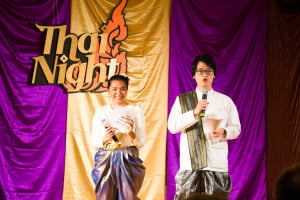
The Old Union ballroom was transformed into a microcosm of Thailand during Thai Night on Saturday, a celebration of the sights, sounds and foods of Thai culture. The event featured a variety of song and dance performances and authentic Thai food, as well as a spicy-food-eating competition.
Those who purchased a ticket to the event had the opportunity to sample an assortment of authentic Thai dishes, including pad thai, green curry, pad see ew, Thai milk tea, grass jelly and tapioca pudding. After attendees registered and got their food, they viewed performances put together by the Stanford Thai Student Association. The night started off with a traditional Thai dance followed by a pop dance. After the dance performances, some participants ate spicy food in the spicy eating contest.
“My favorite part of the night was the spicy eating part,” said performer and attendee Onza Janyaprasert ’18. “People competed in eating really spicy food, and in the first round, they had to eat fried rice with pork and a lot of chili. The second round was meatballs with spicy sauce.”
After the eating contest, Janyaprasert, along with other singers, performed a song composed by the King of Thailand. Janyaprasert appreciated the opportunity to showcase Thai culture.
“The event was great, being one of the only events organized by the Thai Club — it’s good to show Thai culture to everyone, including people from America and from every country,” he said. “What is great about having a large international community is that people can come together and see other cultures around the world without having to be there themselves.”
According to Janyaprasert, the wide variety of performances allowed for a comprehensive snapshot of Thai culture.
“I think a lot of people understood Thai culture better after yesterday because of getting to see the different perspectives of Thai culture from the modern to traditional, in both the food and performances at the event,” he said.
The Thai Student Association is mostly comprised of Thai international students, with about 20 undergraduates and 40 graduate students.
“It’s nice to have a Thai community here because adapting to a new culture is pretty hard, and having that community is a safe zone, where you can step back and always have a piece of home,” Janyaprasert said. “But at the same time you can go out, explore and come back to your comfort zone again.”
Janyaprasert lived in Thailand for 18 years and spent his last year at boarding school. He received a full scholarship from the Thai government to attend Stanford.
“There are two main groups of Thai internationals: Like me, there are those who went to Thai schools and got a scholarship from the government to come here,” he said. “The second group is students from international schools in Thailand who go through a different education system, a British or American system.”
Friend Chaikulngamdee ’16 is a Thai student whose transition into American culture was aided by her experience at an international school.
“It’s harder to adapt to the new culture here without the background of an international school,” she said. “There are a lot of differences in culture — the transition that [the scholarship students] have is different than the one that I’ve had.”
Chaikulngamdee added that the culture in Thailand is very different from American culture, sometimes making the transition difficult for international students.
“The culture in Thailand is … collectivistic, very shy and very reserved,” she said. “It’s very difficult to change so quickly in a year, so [the Thai Student Association] really helps with that.”
Regardless of their different experiences in Thailand, both Chaikulngamdee and Janyaprasert appreciate the opportunity to keep in touch with Thai culture.
“When you grow up in [Thailand], you kind of take [Thai culture] for granted and don’t really try to understand the meaning behind it,” Janyaprasert said. “But once you come here, you have to communicate that to a new group of people. I learned Thai culture better through that, studied it more and got to know more about it.”
Contact Pallavi Krishnarao at pallavik ‘at’ stanford.edu.